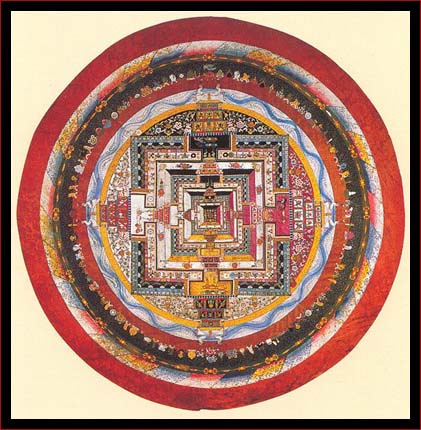



 The
Nose Glasses Of Enlightenment
The
Nose Glasses Of Enlightenment
A large part of Rama's teaching had to do with career development. The first time I saw him, in a public talk in Los Angeles, someone asked him, "Why do you keep talking so much about making money? I thought that enlightenment was about getting beyond your need for money."
Rama replied, "It's not about losing one's need for money; the enlightened still have to eat and pay for rent and auto insurance, just like everyone else. Enlightenment is about losing one's attachment to money." I always liked that distinction.
Most people develop their careers the same way they develop their sense of self. They identify with the reflections of themselves they see in the mirrors that the world holds up to him. They achieve a certain level of career success, become a vice-president or a computer consultant, and legitimately enjoy the image of themselves that is reflected back to them. They bask in its glow and begin to identify with it. When someone asks them who they are, they reply, "I'm a vice-president at Yoyodyne," or "I'm a computer consultant." But that's not who they are. That's a piece of who they are. If tomorrow Yoyodyne went belly up and the bottom fell out of the consulting market, they would still be someone.
But if their identification with who they believed they were yesterday is strong, if they are seriously attached to the image of themselves as vice-president or computer consultant, the market crash could precipitate in them an even more powerful crash, as they search through the ashes of their careers for something else to identify with, someone they can be.
Enlightenment doesn't mean you are beyond the need to pay attention to your career. It just means that you are beyond the need to identify with it. You are beyond the need to identify with anything in the relative world. You have dived so often into the infinite in your daily meditations that your primary identification has shifted away from the finite. But, as Rama pointed out over and over and over, that loss of identification with the world and the things most people use to measure success does not mean that you can't still enjoy those things and turn them to your advantage.
Many people on a spiritual path have come to believe that money and career success are not really a part of that path. It's like they have this wall right smack in the middle of their lives. On one side of the wall is their spiritual life - meditating and reading inspiring books and performing selfless service and hanging out with folks who enjoy doing the same things. And on the other side of the wall there's work, where they are forced to perform silly and meaningless tasks that have nothing to do with spirituality, just to pay for the important part of their lives - the stuff on the other side of the wall.
Rama didn't buy into this constricted definition of what is spiritual and what is not, and he taught his students not to buy into it, either. He lured us into taking career seriously by reminding us of both the practical and the spiritual value of achieving financial success. At the tail end the 20th century, having money has become for the spiritual seeker the equivalent of having walls around the monastery in previous centuries. The walls aren't there to keep the monks in; they're to keep the world out, to create a haven of silence in a noisy world, a place where one can meditate.
And he taught us how career success could actually be a technique for self discovery. In that same public talk in Los Angeles, I remember him saying, "I have spent a great deal of time in spiritual communities. One of the things I noticed there was that one of the most debilitating and destructive things that can happen to a spiritual seeker is being poor. Some people can pull it off, and not let money worry them at all. But for most students of self discovery, when they are constantly concerned about money and worried about how to pay their bills, they lose so much energy worrying that there is little left for self discovery."
He continued, "Since I have begun emphasizing career development in my teaching, I have seen students use challenges in their careers to achieve breakthroughs in their spiritual development that are amazing. I have seen students' faces remain dull and lifeless after a long meditation retreat, but have seen those same students' faces just radiant with light after aceing a job interview and landing their first consulting contract."
And most of all, Rama
taught us about the magic of doing a good job. He deplored the predominant
work ethic of America, in which everyone is just out to make the most
money for the least effort. It's not that he considered it unethical;
he just thought that it was impractical. He taught us to appreciate
work as a technique of meditation and spiritual discovery, for the simple
reason that doing a good job makes you happier than doing a shitty job.
He steered us towards disciplines within the computer field that he
felt were particularly beneficial for practitioners of meditation. Relational
database, artificial intelligence, Web design - fields that require
you, to become successful in them, to hold a great number of objects
in your mind simultaneously, balancing them and bringing them into some
kind of harmony.  He
felt that relational database was remarkably like Tibetan techniques
of visualization, in which monks gaze at a mandala and then try
to reconstruct it perfectly in their own minds.
He
felt that relational database was remarkably like Tibetan techniques
of visualization, in which monks gaze at a mandala and then try
to reconstruct it perfectly in their own minds.
I think these insights about career were right on. Although I was a lazy student, and resisted many of his suggestions about career, I followed enough of them to see their effect on my spiritual life. I really got his teaching about using money to create a meditative space around yourself when I landed my first good job as a programmer and could afford a guest house on a private lake instead of a cramped apartment in a shitty neighborhood. And I got the bit about making breakthroughs in my spiritual life the first time I made a huge career jump. I interviewed for a job at the (then) third largest software company in the world, and they actually offered it to me, instead of the other far more experienced people they had interviewed. My meditations were just ecstasy for a month, and my face shone with a light that had been all too rare for me in my spiritual practice up till then.
But most important, it was at that job that the wall separating my work life from my spiritual life first crumbled and fell. I was living in Malibu at the time, and I remember the moment clearly. I woke up, showered and meditated, and then climbed into my car for the drive down the Coast Highway into Santa Monica, where my new job was located. And I found that I was smiling as I drove, and really looking forward to the day. The realization actually shocked me - it was the first time in my life that my life had become seamless, with no distinctions between what I did to enjoy living and what I did to make a living.
At home I would sit in front of my meditation table and focus my entire attention on simply doing a good job with the meditation. At work I would sit in front of my computer monitor and focus my entire attention on simply doing a good job. No difference.
It was a wonderful feeling, one that I have tried not to lose since. As I have said, I was not a particularly good student. Some students responded to Rama's suggestions about career by taking a leap of faith and enrolling immediately in computer school. I was already in the computer field, and just plodded along for a while, taking the occasional course here and there. And now, years later, I look at the careers of those students who did everything he suggested when he suggested it and see that they are light years ahead of mine. Go figure.
But I followed enough of Rama's suggestions that my career is light years ahead of where it would been if I had never met him. I have achieved a certain level of success as a computer consultant, having a work schedule many would envy and making more than enough money to support my needs. I never achieved greatness in the world of career, but I can't feel bad about it, because the successes I have achieved have enabled me to pursue greatness in other areas.
In fact, I can only think of one contribution I made to the world of business that even deserves mentioning. One of the great lessons I learned in my career is that I should never be a manager. I make a great ronin, a masterless samurai, a hired gun whom companies can hire to clean up the karma in Dodge City, and rely on to do a decent job of it. But I am a really shitty manager. I just don't seem to have the people skills and the patience to deal with a staff who rely on me to prioritize things for them and to sit there listening patiently to their troubles.
The first - and last - time I was talked into being a manager was at a not-particularly-exciting computer security company in the L.A. area. It was a tough environment. I was in charge of eight or nine people, all of us working in one big room, without even Dilbert cubes to create the illusion of 'personal space.' We had an endless series of deadlines, all of them seemingly created without regard to whether they could ever be achieved. The pressure was intense, and was not helped by the fact that we were all trying to cope with it in one big room.
So one morning I had an idea while driving to work, and stopped off at a dime store on the way in to buy the props I needed to implement my sole contribution to management science. I arrived at work and called a meeting of the entire staff, to explain my new concept to them. They were undoubtedly expecting something I had read in some business book, and were understandably perplexed when I announced the new stress-reduction policy.
I pulled the props I
had purchased from their paper sack - a hammer, a box of nails, and
a set of your classic nose glasses. You know, thick black nerd frames
with no lenses, with a big plastic nose and bushy black mustache and
eyebrows attached to them. I explained the concept to the troops. "These,"
I said, "are the Department Nose Glasses.  I
am going to hang them here on the wall on this nail, in plain sight
of everyone. The new rule around here is that whenever any two people
agree that a third person is losing it, and allowing the stress and
the deadlines to get to them, they can require the stressed-out person
to put on the Department Nose Glasses and wear them until he or she
lightens up."
I
am going to hang them here on the wall on this nail, in plain sight
of everyone. The new rule around here is that whenever any two people
agree that a third person is losing it, and allowing the stress and
the deadlines to get to them, they can require the stressed-out person
to put on the Department Nose Glasses and wear them until he or she
lightens up."
They looked at me like I was an escapee from a mental asylum. But I was the boss, so they went along with it. And you know what? It worked.
The Department Nose Glasses changed our work environment for the better almost immediately. At first, people invoked the dreaded nose glasses as a kind of joke. But then they started noticing that it really worked, and that the level of stress in the room had gone down considerably.
The only trouble with the Department Nose Glasses was that I was not smart enough when announcing the new policy to exempt myself from it. As a result, I had to wear my own nose glasses more than once. So I can tell you from personal experience that they work. I would get all stressed out by the latest series of infuriating deadlines, and start taking that stress out on my co-workers. They would take it as long as they could, but then they would grab me and lead me gently to the wall, and point to the Department Nose Glasses. I would reluctantly remove them from the nail and put them on.
But of course I was still stressed out. So I would continue to pace around the room, cornering anyone I could, trying to get them to listen to my latest round of bitching about the senior management and what dolts they all were. And my coworkers would stand there laughing at me, because I was trying to be serious while wearing nose glasses, and the only possible response to someone wearing nose glasses is to laugh at them until they begin to laugh at themselves.
I am no longer a manager, but I still have the nose glasses. I carry them around with me in the same leather backpack I use to tote around the Vaio Te Ching. And when I get stressed out at work, I excuse myself and go to the restroom, where I carefully wait for everyone to leave - I may be crazy, but I'm not stupid! - before putting them on and looking at myself in the mirror. Within seconds, I am laughing, the stress forgotten. It's a remarkable tool for self discovery. I honestly believe that the world would be a better place if everyone had to carry around their own set of nose glasses, and could use them to lighten their own lives and those of the people they meet.
Nose glasses, and their proper use, have become one of my favorite tools in the development of my career, and in my self discovery. They have helped me to understand that distinction that Rama drew the first night I saw him between the need for money and career success and the attachment to them. Every time I make a career jump, and am tempted to take it seriously and identify with it, all I have to do is reach into my backpack and put on my nose glasses and catch a glimpse of myself in a nearby window or mirror, and I begin to laugh.
Laughter is a good thing. It is, for me, Rama's central teaching, the thing he most wanted us to achieve in this or any lifetime. As someone wrote so eloquently and so anonymously once on a Rama-related message board, "The guy who could disappear and levitate and move the stars around in the desert was sitting up on stage and telling me to stay funny." In your pursuit of career success, and in your pursuit of enlightenment, you might want to consider the purchase of a good pair of nose glasses. I can't think of a more cost-effective tool to help you stay funny.
<< Back to
Ramalila.NET
![]() |
|![]() Also
visit Ramalila.COM
>>
Also
visit Ramalila.COM
>>